Leadership and Management for Service Industries: ABC Consult Report
VerifiedAdded on 2023/01/23
|10
|2830
|47
Report
AI Summary
This report provides a comprehensive analysis of leadership and management within the service industry, focusing on the application of hard and soft skills in organizations like Wa Pila Hotels. It examines current and future management skills, emphasizing the importance of technology-oriented skills such as innovative thinking and market trend awareness. The report delves into the impact of technology on leadership styles, change management systems, and the critical evaluation of these changes. It also compares different service industry organizations' change management approaches and leadership in implementing change, highlighting transformational and unplanned changes and their effects on leadership and management. Furthermore, the report discusses the characteristics of effective managers, multigenerational leaders, and the influence of various management styles, such as autocratic and democratic, in the context of the hospitality industry.
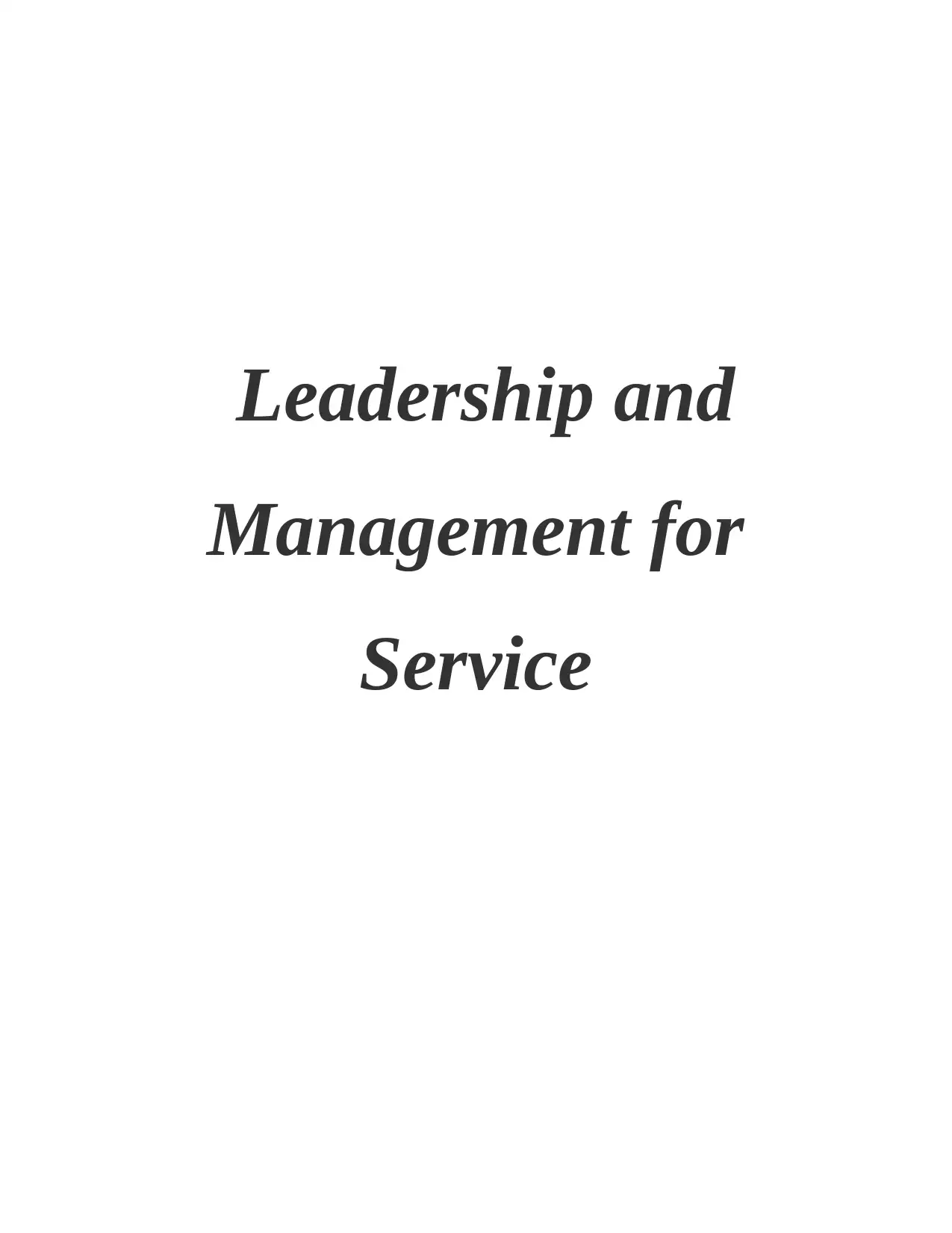
Leadership and
Management for
Service
Management for
Service
Paraphrase This Document
Need a fresh take? Get an instant paraphrase of this document with our AI Paraphraser
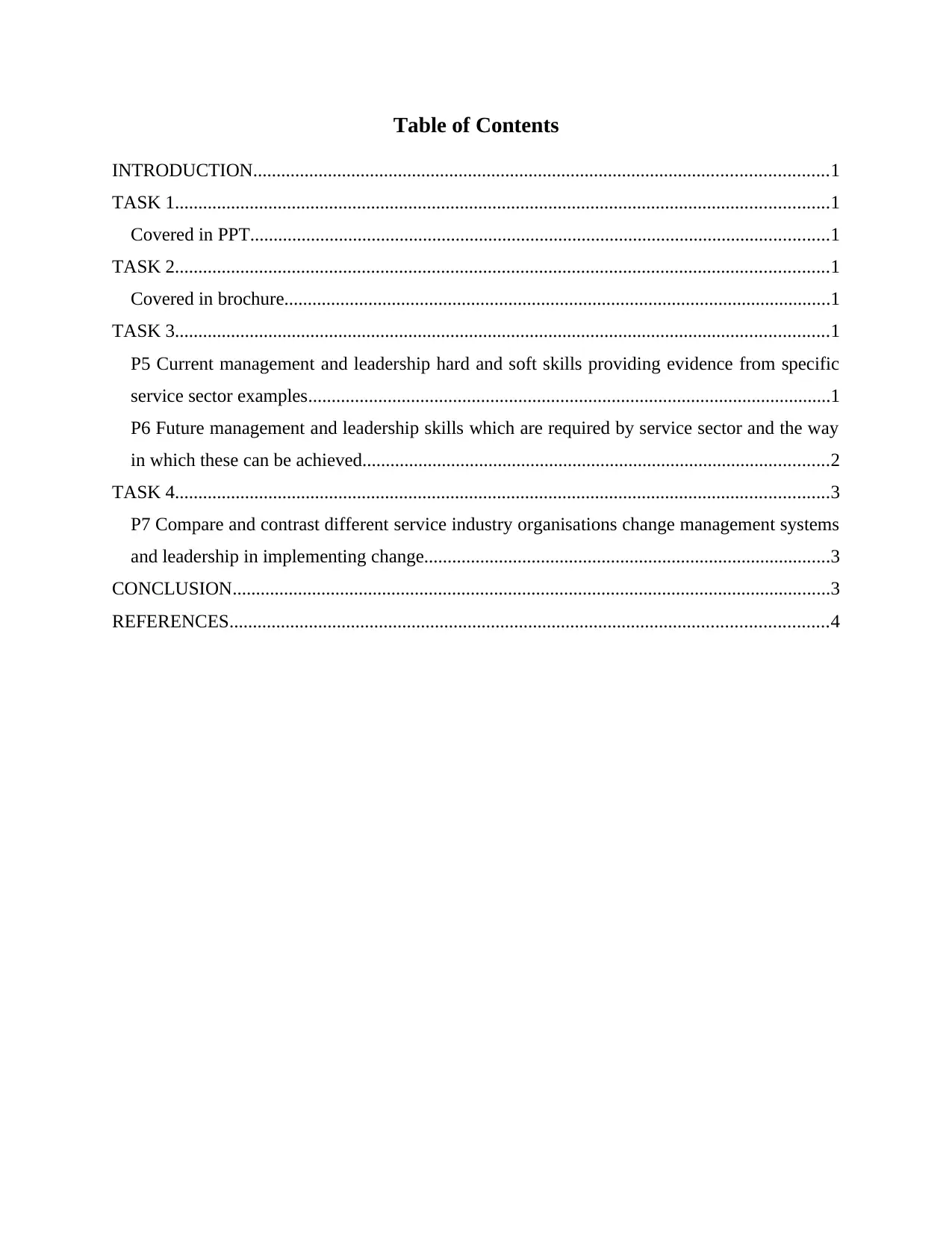
Table of Contents
INTRODUCTION...........................................................................................................................1
TASK 1............................................................................................................................................1
Covered in PPT............................................................................................................................1
TASK 2............................................................................................................................................1
Covered in brochure.....................................................................................................................1
TASK 3............................................................................................................................................1
P5 Current management and leadership hard and soft skills providing evidence from specific
service sector examples................................................................................................................1
P6 Future management and leadership skills which are required by service sector and the way
in which these can be achieved....................................................................................................2
TASK 4............................................................................................................................................3
P7 Compare and contrast different service industry organisations change management systems
and leadership in implementing change.......................................................................................3
CONCLUSION................................................................................................................................3
REFERENCES................................................................................................................................4
INTRODUCTION...........................................................................................................................1
TASK 1............................................................................................................................................1
Covered in PPT............................................................................................................................1
TASK 2............................................................................................................................................1
Covered in brochure.....................................................................................................................1
TASK 3............................................................................................................................................1
P5 Current management and leadership hard and soft skills providing evidence from specific
service sector examples................................................................................................................1
P6 Future management and leadership skills which are required by service sector and the way
in which these can be achieved....................................................................................................2
TASK 4............................................................................................................................................3
P7 Compare and contrast different service industry organisations change management systems
and leadership in implementing change.......................................................................................3
CONCLUSION................................................................................................................................3
REFERENCES................................................................................................................................4
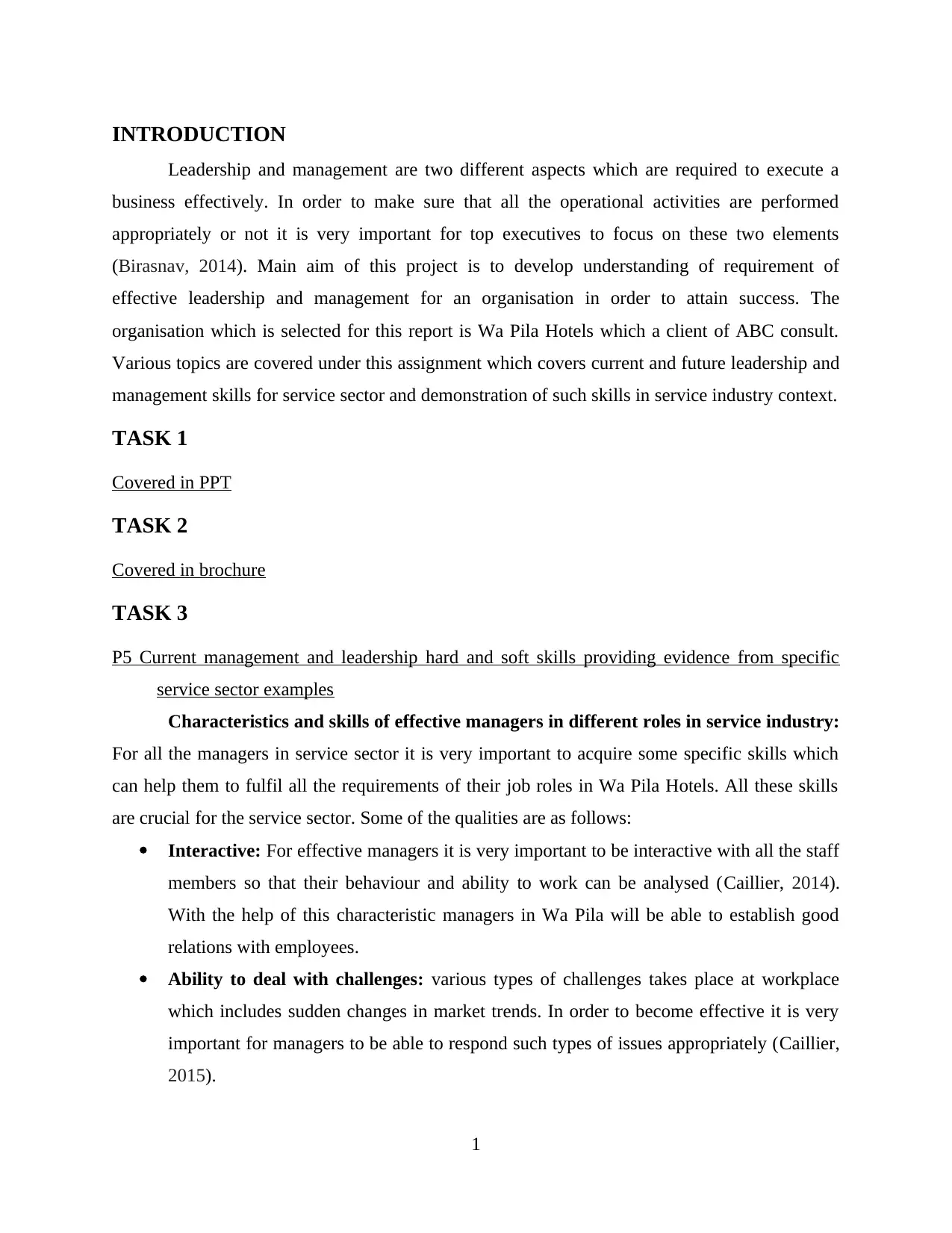
INTRODUCTION
Leadership and management are two different aspects which are required to execute a
business effectively. In order to make sure that all the operational activities are performed
appropriately or not it is very important for top executives to focus on these two elements
(Birasnav, 2014). Main aim of this project is to develop understanding of requirement of
effective leadership and management for an organisation in order to attain success. The
organisation which is selected for this report is Wa Pila Hotels which a client of ABC consult.
Various topics are covered under this assignment which covers current and future leadership and
management skills for service sector and demonstration of such skills in service industry context.
TASK 1
Covered in PPT
TASK 2
Covered in brochure
TASK 3
P5 Current management and leadership hard and soft skills providing evidence from specific
service sector examples
Characteristics and skills of effective managers in different roles in service industry:
For all the managers in service sector it is very important to acquire some specific skills which
can help them to fulfil all the requirements of their job roles in Wa Pila Hotels. All these skills
are crucial for the service sector. Some of the qualities are as follows:
Interactive: For effective managers it is very important to be interactive with all the staff
members so that their behaviour and ability to work can be analysed (Caillier, 2014).
With the help of this characteristic managers in Wa Pila will be able to establish good
relations with employees.
Ability to deal with challenges: various types of challenges takes place at workplace
which includes sudden changes in market trends. In order to become effective it is very
important for managers to be able to respond such types of issues appropriately (Caillier,
2015).
1
Leadership and management are two different aspects which are required to execute a
business effectively. In order to make sure that all the operational activities are performed
appropriately or not it is very important for top executives to focus on these two elements
(Birasnav, 2014). Main aim of this project is to develop understanding of requirement of
effective leadership and management for an organisation in order to attain success. The
organisation which is selected for this report is Wa Pila Hotels which a client of ABC consult.
Various topics are covered under this assignment which covers current and future leadership and
management skills for service sector and demonstration of such skills in service industry context.
TASK 1
Covered in PPT
TASK 2
Covered in brochure
TASK 3
P5 Current management and leadership hard and soft skills providing evidence from specific
service sector examples
Characteristics and skills of effective managers in different roles in service industry:
For all the managers in service sector it is very important to acquire some specific skills which
can help them to fulfil all the requirements of their job roles in Wa Pila Hotels. All these skills
are crucial for the service sector. Some of the qualities are as follows:
Interactive: For effective managers it is very important to be interactive with all the staff
members so that their behaviour and ability to work can be analysed (Caillier, 2014).
With the help of this characteristic managers in Wa Pila will be able to establish good
relations with employees.
Ability to deal with challenges: various types of challenges takes place at workplace
which includes sudden changes in market trends. In order to become effective it is very
important for managers to be able to respond such types of issues appropriately (Caillier,
2015).
1
⊘ This is a preview!⊘
Do you want full access?
Subscribe today to unlock all pages.

Trusted by 1+ million students worldwide
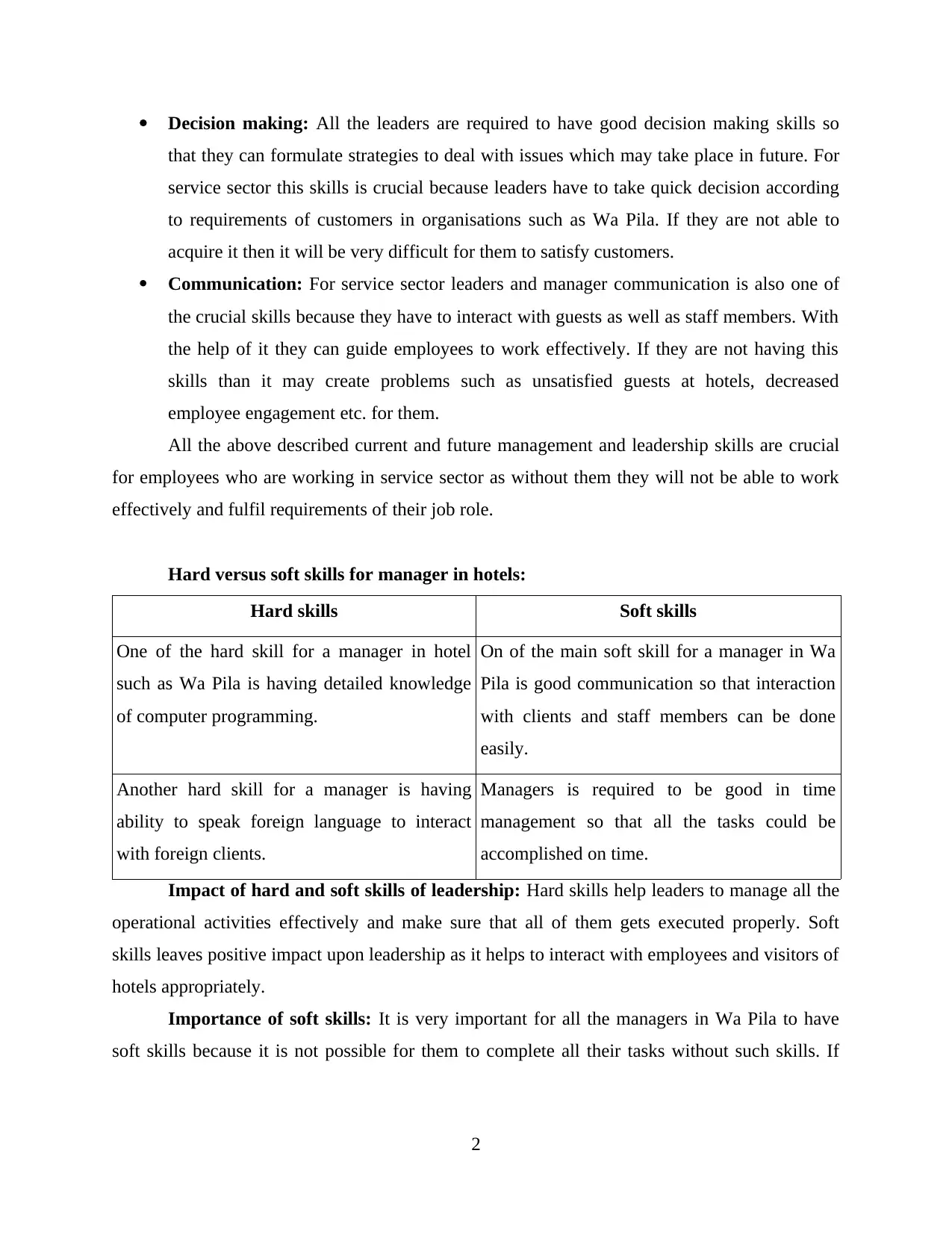
Decision making: All the leaders are required to have good decision making skills so
that they can formulate strategies to deal with issues which may take place in future. For
service sector this skills is crucial because leaders have to take quick decision according
to requirements of customers in organisations such as Wa Pila. If they are not able to
acquire it then it will be very difficult for them to satisfy customers.
Communication: For service sector leaders and manager communication is also one of
the crucial skills because they have to interact with guests as well as staff members. With
the help of it they can guide employees to work effectively. If they are not having this
skills than it may create problems such as unsatisfied guests at hotels, decreased
employee engagement etc. for them.
All the above described current and future management and leadership skills are crucial
for employees who are working in service sector as without them they will not be able to work
effectively and fulfil requirements of their job role.
Hard versus soft skills for manager in hotels:
Hard skills Soft skills
One of the hard skill for a manager in hotel
such as Wa Pila is having detailed knowledge
of computer programming.
On of the main soft skill for a manager in Wa
Pila is good communication so that interaction
with clients and staff members can be done
easily.
Another hard skill for a manager is having
ability to speak foreign language to interact
with foreign clients.
Managers is required to be good in time
management so that all the tasks could be
accomplished on time.
Impact of hard and soft skills of leadership: Hard skills help leaders to manage all the
operational activities effectively and make sure that all of them gets executed properly. Soft
skills leaves positive impact upon leadership as it helps to interact with employees and visitors of
hotels appropriately.
Importance of soft skills: It is very important for all the managers in Wa Pila to have
soft skills because it is not possible for them to complete all their tasks without such skills. If
2
that they can formulate strategies to deal with issues which may take place in future. For
service sector this skills is crucial because leaders have to take quick decision according
to requirements of customers in organisations such as Wa Pila. If they are not able to
acquire it then it will be very difficult for them to satisfy customers.
Communication: For service sector leaders and manager communication is also one of
the crucial skills because they have to interact with guests as well as staff members. With
the help of it they can guide employees to work effectively. If they are not having this
skills than it may create problems such as unsatisfied guests at hotels, decreased
employee engagement etc. for them.
All the above described current and future management and leadership skills are crucial
for employees who are working in service sector as without them they will not be able to work
effectively and fulfil requirements of their job role.
Hard versus soft skills for manager in hotels:
Hard skills Soft skills
One of the hard skill for a manager in hotel
such as Wa Pila is having detailed knowledge
of computer programming.
On of the main soft skill for a manager in Wa
Pila is good communication so that interaction
with clients and staff members can be done
easily.
Another hard skill for a manager is having
ability to speak foreign language to interact
with foreign clients.
Managers is required to be good in time
management so that all the tasks could be
accomplished on time.
Impact of hard and soft skills of leadership: Hard skills help leaders to manage all the
operational activities effectively and make sure that all of them gets executed properly. Soft
skills leaves positive impact upon leadership as it helps to interact with employees and visitors of
hotels appropriately.
Importance of soft skills: It is very important for all the managers in Wa Pila to have
soft skills because it is not possible for them to complete all their tasks without such skills. If
2
Paraphrase This Document
Need a fresh take? Get an instant paraphrase of this document with our AI Paraphraser
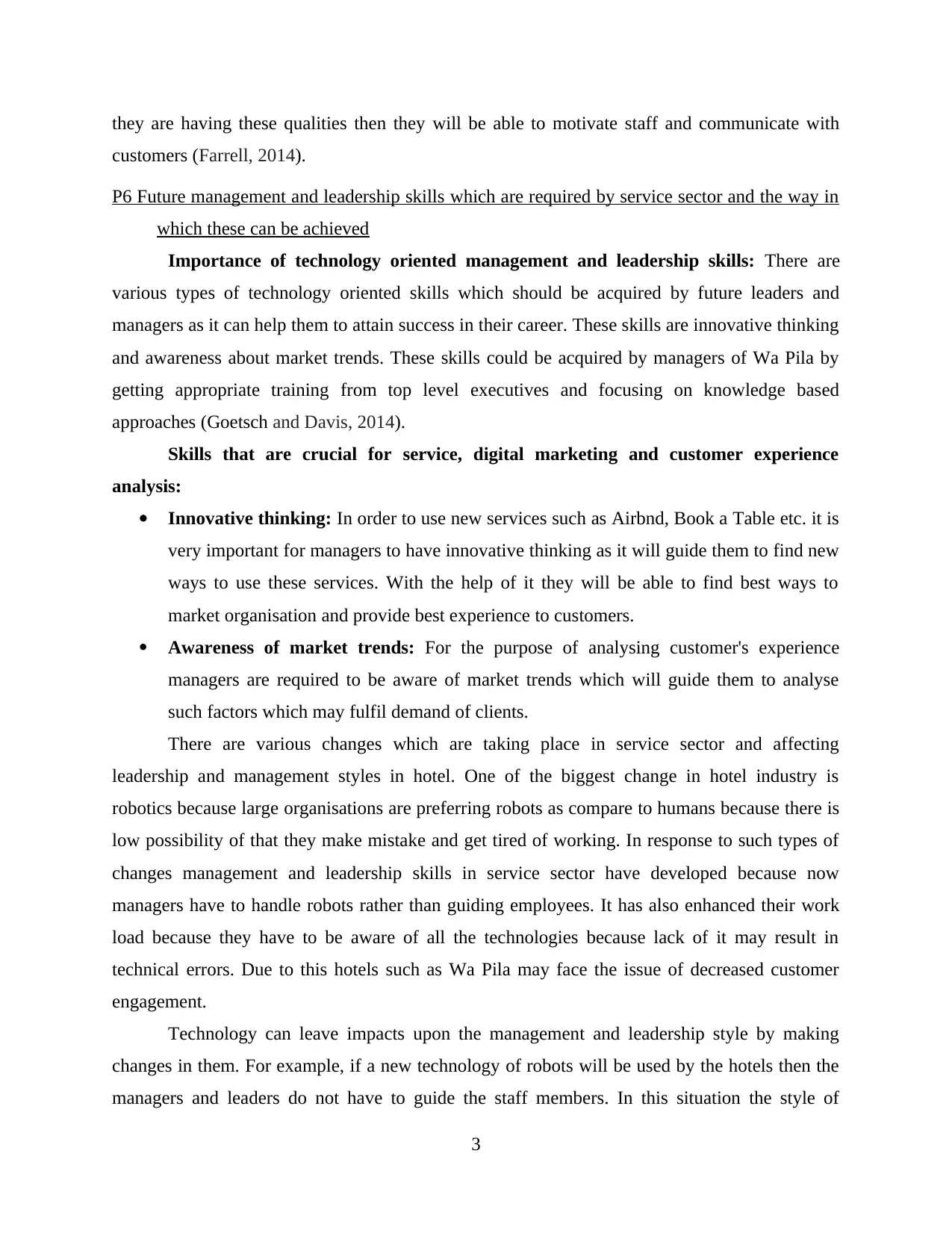
they are having these qualities then they will be able to motivate staff and communicate with
customers (Farrell, 2014).
P6 Future management and leadership skills which are required by service sector and the way in
which these can be achieved
Importance of technology oriented management and leadership skills: There are
various types of technology oriented skills which should be acquired by future leaders and
managers as it can help them to attain success in their career. These skills are innovative thinking
and awareness about market trends. These skills could be acquired by managers of Wa Pila by
getting appropriate training from top level executives and focusing on knowledge based
approaches (Goetsch and Davis, 2014).
Skills that are crucial for service, digital marketing and customer experience
analysis:
Innovative thinking: In order to use new services such as Airbnd, Book a Table etc. it is
very important for managers to have innovative thinking as it will guide them to find new
ways to use these services. With the help of it they will be able to find best ways to
market organisation and provide best experience to customers.
Awareness of market trends: For the purpose of analysing customer's experience
managers are required to be aware of market trends which will guide them to analyse
such factors which may fulfil demand of clients.
There are various changes which are taking place in service sector and affecting
leadership and management styles in hotel. One of the biggest change in hotel industry is
robotics because large organisations are preferring robots as compare to humans because there is
low possibility of that they make mistake and get tired of working. In response to such types of
changes management and leadership skills in service sector have developed because now
managers have to handle robots rather than guiding employees. It has also enhanced their work
load because they have to be aware of all the technologies because lack of it may result in
technical errors. Due to this hotels such as Wa Pila may face the issue of decreased customer
engagement.
Technology can leave impacts upon the management and leadership style by making
changes in them. For example, if a new technology of robots will be used by the hotels then the
managers and leaders do not have to guide the staff members. In this situation the style of
3
customers (Farrell, 2014).
P6 Future management and leadership skills which are required by service sector and the way in
which these can be achieved
Importance of technology oriented management and leadership skills: There are
various types of technology oriented skills which should be acquired by future leaders and
managers as it can help them to attain success in their career. These skills are innovative thinking
and awareness about market trends. These skills could be acquired by managers of Wa Pila by
getting appropriate training from top level executives and focusing on knowledge based
approaches (Goetsch and Davis, 2014).
Skills that are crucial for service, digital marketing and customer experience
analysis:
Innovative thinking: In order to use new services such as Airbnd, Book a Table etc. it is
very important for managers to have innovative thinking as it will guide them to find new
ways to use these services. With the help of it they will be able to find best ways to
market organisation and provide best experience to customers.
Awareness of market trends: For the purpose of analysing customer's experience
managers are required to be aware of market trends which will guide them to analyse
such factors which may fulfil demand of clients.
There are various changes which are taking place in service sector and affecting
leadership and management styles in hotel. One of the biggest change in hotel industry is
robotics because large organisations are preferring robots as compare to humans because there is
low possibility of that they make mistake and get tired of working. In response to such types of
changes management and leadership skills in service sector have developed because now
managers have to handle robots rather than guiding employees. It has also enhanced their work
load because they have to be aware of all the technologies because lack of it may result in
technical errors. Due to this hotels such as Wa Pila may face the issue of decreased customer
engagement.
Technology can leave impacts upon the management and leadership style by making
changes in them. For example, if a new technology of robots will be used by the hotels then the
managers and leaders do not have to guide the staff members. In this situation the style of
3
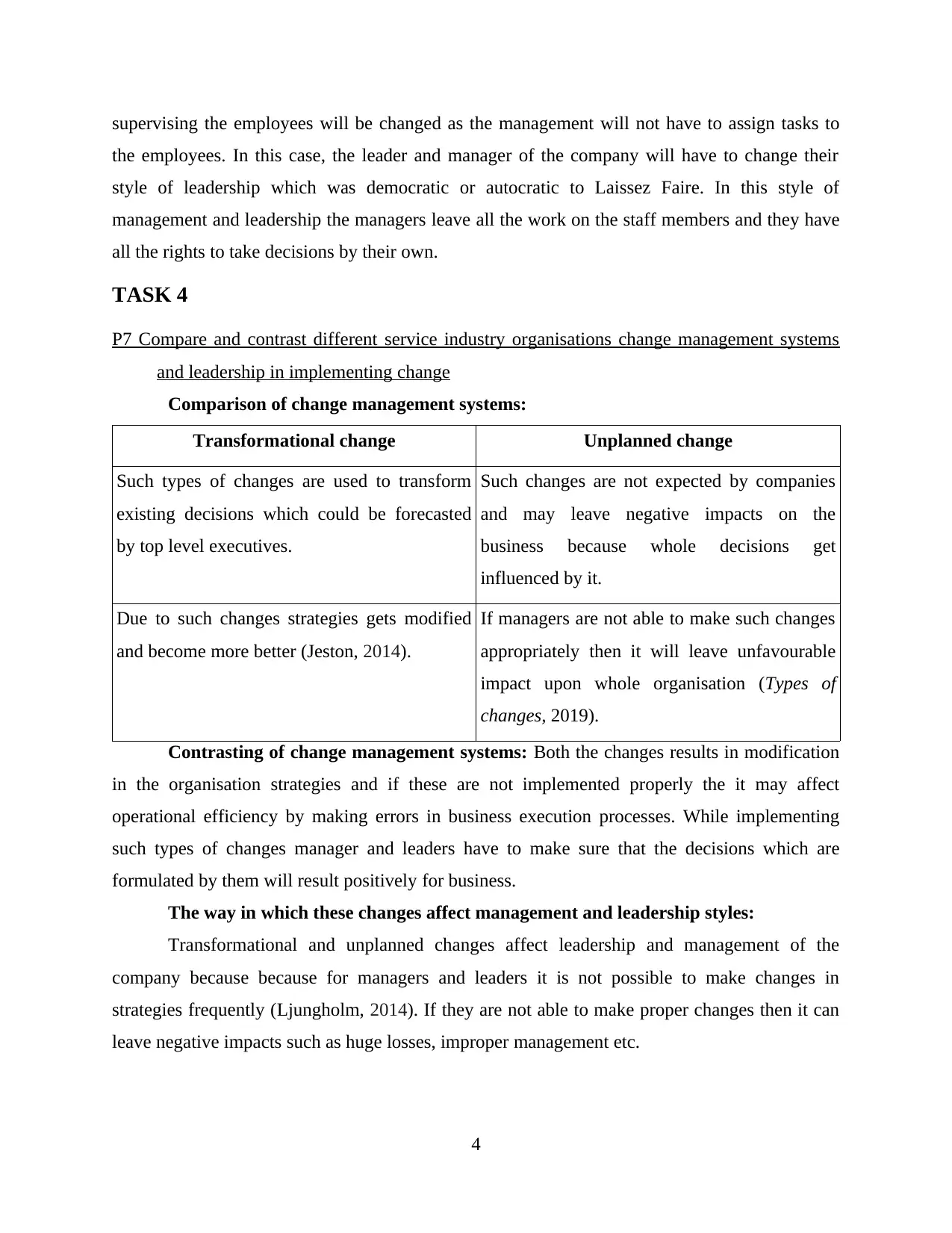
supervising the employees will be changed as the management will not have to assign tasks to
the employees. In this case, the leader and manager of the company will have to change their
style of leadership which was democratic or autocratic to Laissez Faire. In this style of
management and leadership the managers leave all the work on the staff members and they have
all the rights to take decisions by their own.
TASK 4
P7 Compare and contrast different service industry organisations change management systems
and leadership in implementing change
Comparison of change management systems:
Transformational change Unplanned change
Such types of changes are used to transform
existing decisions which could be forecasted
by top level executives.
Such changes are not expected by companies
and may leave negative impacts on the
business because whole decisions get
influenced by it.
Due to such changes strategies gets modified
and become more better (Jeston, 2014).
If managers are not able to make such changes
appropriately then it will leave unfavourable
impact upon whole organisation (Types of
changes, 2019).
Contrasting of change management systems: Both the changes results in modification
in the organisation strategies and if these are not implemented properly the it may affect
operational efficiency by making errors in business execution processes. While implementing
such types of changes manager and leaders have to make sure that the decisions which are
formulated by them will result positively for business.
The way in which these changes affect management and leadership styles:
Transformational and unplanned changes affect leadership and management of the
company because because for managers and leaders it is not possible to make changes in
strategies frequently (Ljungholm, 2014). If they are not able to make proper changes then it can
leave negative impacts such as huge losses, improper management etc.
4
the employees. In this case, the leader and manager of the company will have to change their
style of leadership which was democratic or autocratic to Laissez Faire. In this style of
management and leadership the managers leave all the work on the staff members and they have
all the rights to take decisions by their own.
TASK 4
P7 Compare and contrast different service industry organisations change management systems
and leadership in implementing change
Comparison of change management systems:
Transformational change Unplanned change
Such types of changes are used to transform
existing decisions which could be forecasted
by top level executives.
Such changes are not expected by companies
and may leave negative impacts on the
business because whole decisions get
influenced by it.
Due to such changes strategies gets modified
and become more better (Jeston, 2014).
If managers are not able to make such changes
appropriately then it will leave unfavourable
impact upon whole organisation (Types of
changes, 2019).
Contrasting of change management systems: Both the changes results in modification
in the organisation strategies and if these are not implemented properly the it may affect
operational efficiency by making errors in business execution processes. While implementing
such types of changes manager and leaders have to make sure that the decisions which are
formulated by them will result positively for business.
The way in which these changes affect management and leadership styles:
Transformational and unplanned changes affect leadership and management of the
company because because for managers and leaders it is not possible to make changes in
strategies frequently (Ljungholm, 2014). If they are not able to make proper changes then it can
leave negative impacts such as huge losses, improper management etc.
4
⊘ This is a preview!⊘
Do you want full access?
Subscribe today to unlock all pages.

Trusted by 1+ million students worldwide
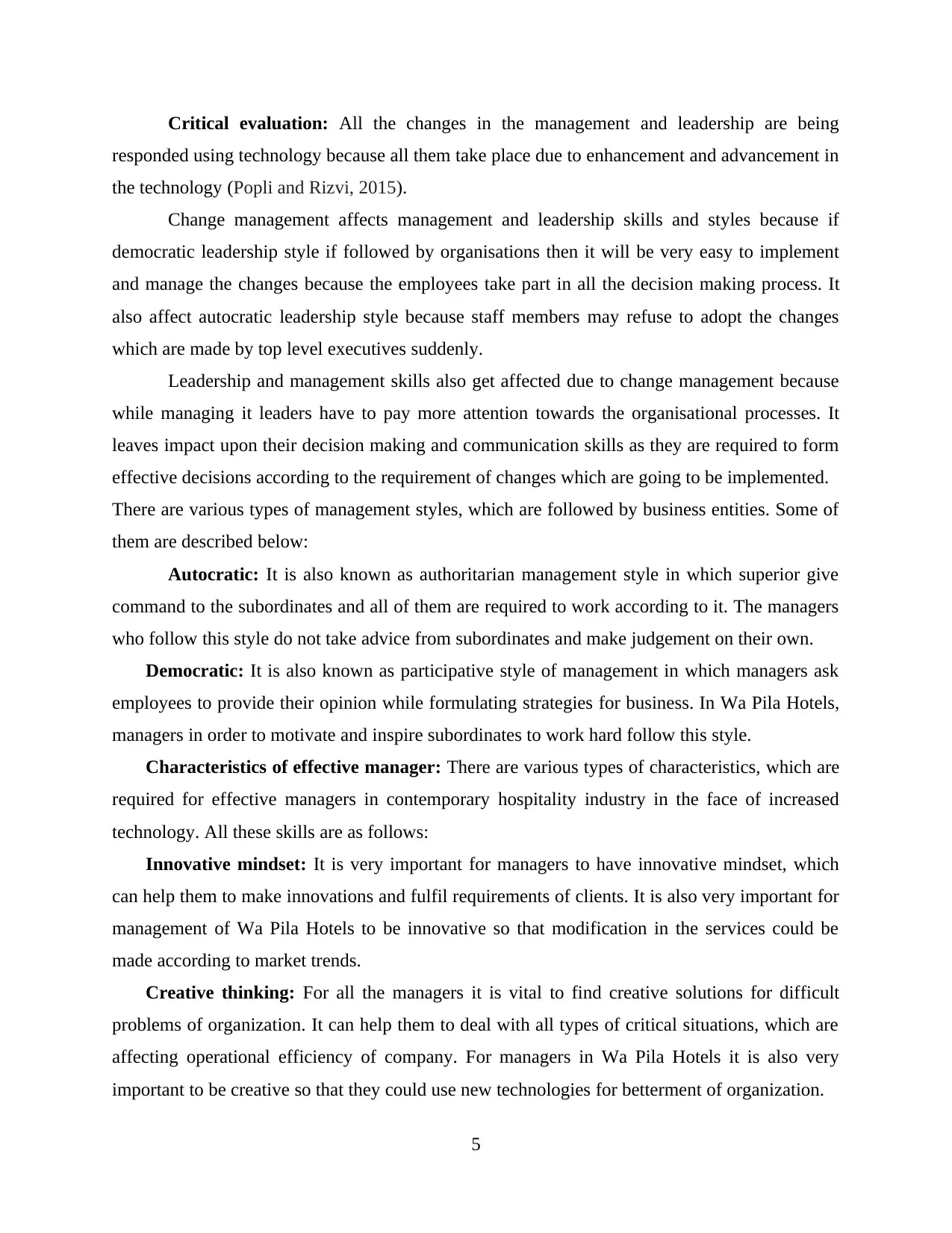
Critical evaluation: All the changes in the management and leadership are being
responded using technology because all them take place due to enhancement and advancement in
the technology (Popli and Rizvi, 2015).
Change management affects management and leadership skills and styles because if
democratic leadership style if followed by organisations then it will be very easy to implement
and manage the changes because the employees take part in all the decision making process. It
also affect autocratic leadership style because staff members may refuse to adopt the changes
which are made by top level executives suddenly.
Leadership and management skills also get affected due to change management because
while managing it leaders have to pay more attention towards the organisational processes. It
leaves impact upon their decision making and communication skills as they are required to form
effective decisions according to the requirement of changes which are going to be implemented.
There are various types of management styles, which are followed by business entities. Some of
them are described below:
Autocratic: It is also known as authoritarian management style in which superior give
command to the subordinates and all of them are required to work according to it. The managers
who follow this style do not take advice from subordinates and make judgement on their own.
Democratic: It is also known as participative style of management in which managers ask
employees to provide their opinion while formulating strategies for business. In Wa Pila Hotels,
managers in order to motivate and inspire subordinates to work hard follow this style.
Characteristics of effective manager: There are various types of characteristics, which are
required for effective managers in contemporary hospitality industry in the face of increased
technology. All these skills are as follows:
Innovative mindset: It is very important for managers to have innovative mindset, which
can help them to make innovations and fulfil requirements of clients. It is also very important for
management of Wa Pila Hotels to be innovative so that modification in the services could be
made according to market trends.
Creative thinking: For all the managers it is vital to find creative solutions for difficult
problems of organization. It can help them to deal with all types of critical situations, which are
affecting operational efficiency of company. For managers in Wa Pila Hotels it is also very
important to be creative so that they could use new technologies for betterment of organization.
5
responded using technology because all them take place due to enhancement and advancement in
the technology (Popli and Rizvi, 2015).
Change management affects management and leadership skills and styles because if
democratic leadership style if followed by organisations then it will be very easy to implement
and manage the changes because the employees take part in all the decision making process. It
also affect autocratic leadership style because staff members may refuse to adopt the changes
which are made by top level executives suddenly.
Leadership and management skills also get affected due to change management because
while managing it leaders have to pay more attention towards the organisational processes. It
leaves impact upon their decision making and communication skills as they are required to form
effective decisions according to the requirement of changes which are going to be implemented.
There are various types of management styles, which are followed by business entities. Some of
them are described below:
Autocratic: It is also known as authoritarian management style in which superior give
command to the subordinates and all of them are required to work according to it. The managers
who follow this style do not take advice from subordinates and make judgement on their own.
Democratic: It is also known as participative style of management in which managers ask
employees to provide their opinion while formulating strategies for business. In Wa Pila Hotels,
managers in order to motivate and inspire subordinates to work hard follow this style.
Characteristics of effective manager: There are various types of characteristics, which are
required for effective managers in contemporary hospitality industry in the face of increased
technology. All these skills are as follows:
Innovative mindset: It is very important for managers to have innovative mindset, which
can help them to make innovations and fulfil requirements of clients. It is also very important for
management of Wa Pila Hotels to be innovative so that modification in the services could be
made according to market trends.
Creative thinking: For all the managers it is vital to find creative solutions for difficult
problems of organization. It can help them to deal with all types of critical situations, which are
affecting operational efficiency of company. For managers in Wa Pila Hotels it is also very
important to be creative so that they could use new technologies for betterment of organization.
5
Paraphrase This Document
Need a fresh take? Get an instant paraphrase of this document with our AI Paraphraser
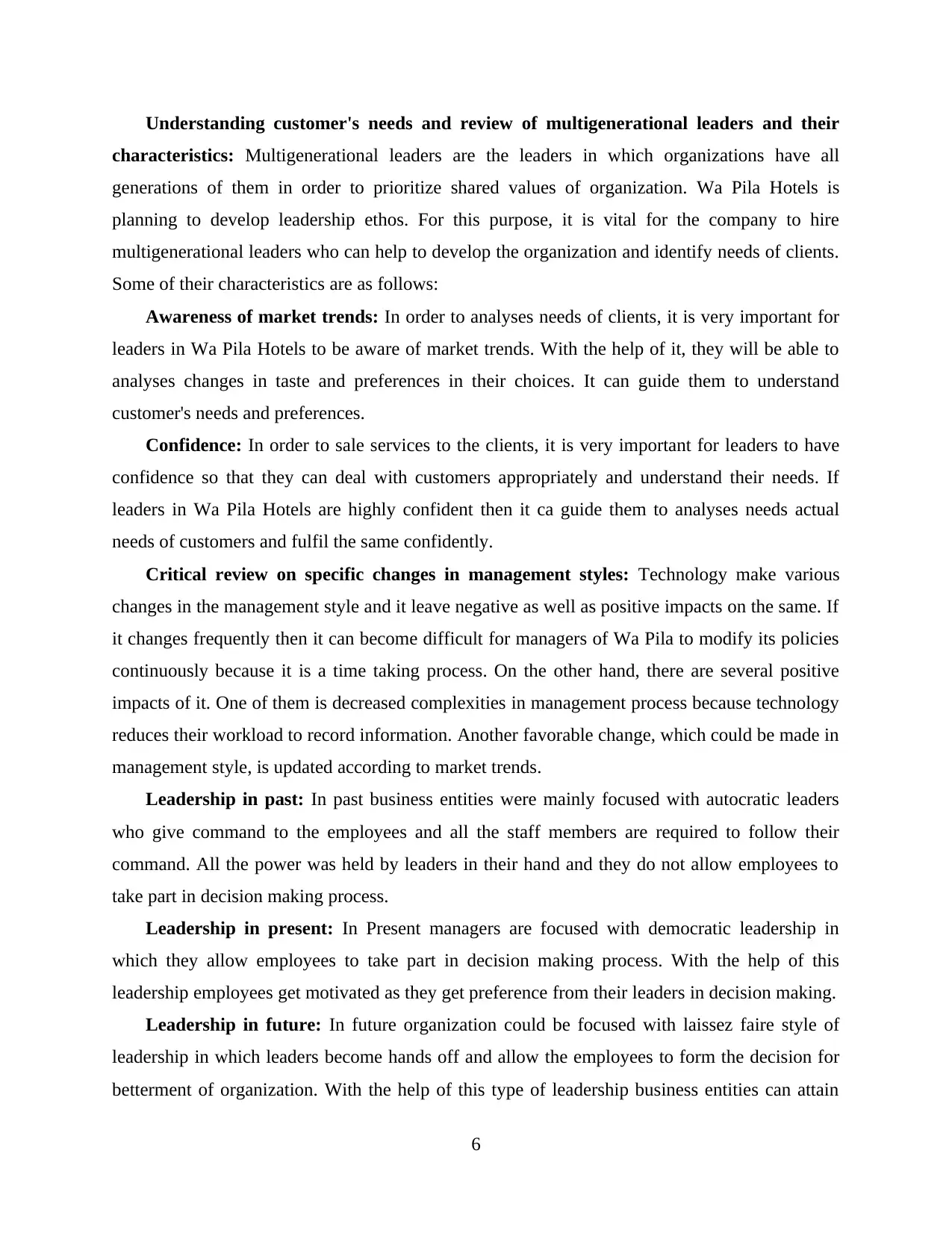
Understanding customer's needs and review of multigenerational leaders and their
characteristics: Multigenerational leaders are the leaders in which organizations have all
generations of them in order to prioritize shared values of organization. Wa Pila Hotels is
planning to develop leadership ethos. For this purpose, it is vital for the company to hire
multigenerational leaders who can help to develop the organization and identify needs of clients.
Some of their characteristics are as follows:
Awareness of market trends: In order to analyses needs of clients, it is very important for
leaders in Wa Pila Hotels to be aware of market trends. With the help of it, they will be able to
analyses changes in taste and preferences in their choices. It can guide them to understand
customer's needs and preferences.
Confidence: In order to sale services to the clients, it is very important for leaders to have
confidence so that they can deal with customers appropriately and understand their needs. If
leaders in Wa Pila Hotels are highly confident then it ca guide them to analyses needs actual
needs of customers and fulfil the same confidently.
Critical review on specific changes in management styles: Technology make various
changes in the management style and it leave negative as well as positive impacts on the same. If
it changes frequently then it can become difficult for managers of Wa Pila to modify its policies
continuously because it is a time taking process. On the other hand, there are several positive
impacts of it. One of them is decreased complexities in management process because technology
reduces their workload to record information. Another favorable change, which could be made in
management style, is updated according to market trends.
Leadership in past: In past business entities were mainly focused with autocratic leaders
who give command to the employees and all the staff members are required to follow their
command. All the power was held by leaders in their hand and they do not allow employees to
take part in decision making process.
Leadership in present: In Present managers are focused with democratic leadership in
which they allow employees to take part in decision making process. With the help of this
leadership employees get motivated as they get preference from their leaders in decision making.
Leadership in future: In future organization could be focused with laissez faire style of
leadership in which leaders become hands off and allow the employees to form the decision for
betterment of organization. With the help of this type of leadership business entities can attain
6
characteristics: Multigenerational leaders are the leaders in which organizations have all
generations of them in order to prioritize shared values of organization. Wa Pila Hotels is
planning to develop leadership ethos. For this purpose, it is vital for the company to hire
multigenerational leaders who can help to develop the organization and identify needs of clients.
Some of their characteristics are as follows:
Awareness of market trends: In order to analyses needs of clients, it is very important for
leaders in Wa Pila Hotels to be aware of market trends. With the help of it, they will be able to
analyses changes in taste and preferences in their choices. It can guide them to understand
customer's needs and preferences.
Confidence: In order to sale services to the clients, it is very important for leaders to have
confidence so that they can deal with customers appropriately and understand their needs. If
leaders in Wa Pila Hotels are highly confident then it ca guide them to analyses needs actual
needs of customers and fulfil the same confidently.
Critical review on specific changes in management styles: Technology make various
changes in the management style and it leave negative as well as positive impacts on the same. If
it changes frequently then it can become difficult for managers of Wa Pila to modify its policies
continuously because it is a time taking process. On the other hand, there are several positive
impacts of it. One of them is decreased complexities in management process because technology
reduces their workload to record information. Another favorable change, which could be made in
management style, is updated according to market trends.
Leadership in past: In past business entities were mainly focused with autocratic leaders
who give command to the employees and all the staff members are required to follow their
command. All the power was held by leaders in their hand and they do not allow employees to
take part in decision making process.
Leadership in present: In Present managers are focused with democratic leadership in
which they allow employees to take part in decision making process. With the help of this
leadership employees get motivated as they get preference from their leaders in decision making.
Leadership in future: In future organization could be focused with laissez faire style of
leadership in which leaders become hands off and allow the employees to form the decision for
betterment of organization. With the help of this type of leadership business entities can attain
6
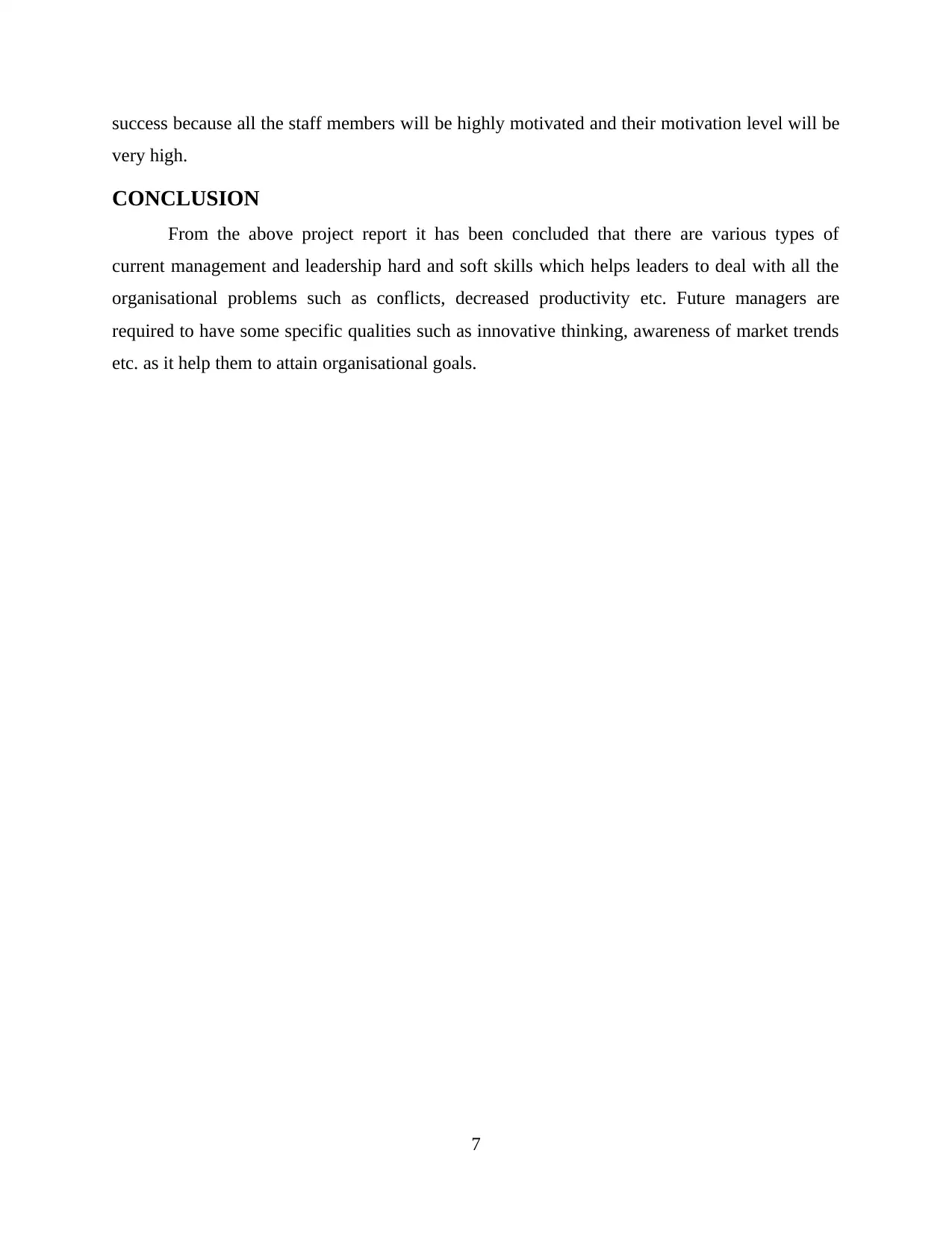
success because all the staff members will be highly motivated and their motivation level will be
very high.
CONCLUSION
From the above project report it has been concluded that there are various types of
current management and leadership hard and soft skills which helps leaders to deal with all the
organisational problems such as conflicts, decreased productivity etc. Future managers are
required to have some specific qualities such as innovative thinking, awareness of market trends
etc. as it help them to attain organisational goals.
7
very high.
CONCLUSION
From the above project report it has been concluded that there are various types of
current management and leadership hard and soft skills which helps leaders to deal with all the
organisational problems such as conflicts, decreased productivity etc. Future managers are
required to have some specific qualities such as innovative thinking, awareness of market trends
etc. as it help them to attain organisational goals.
7
⊘ This is a preview!⊘
Do you want full access?
Subscribe today to unlock all pages.

Trusted by 1+ million students worldwide
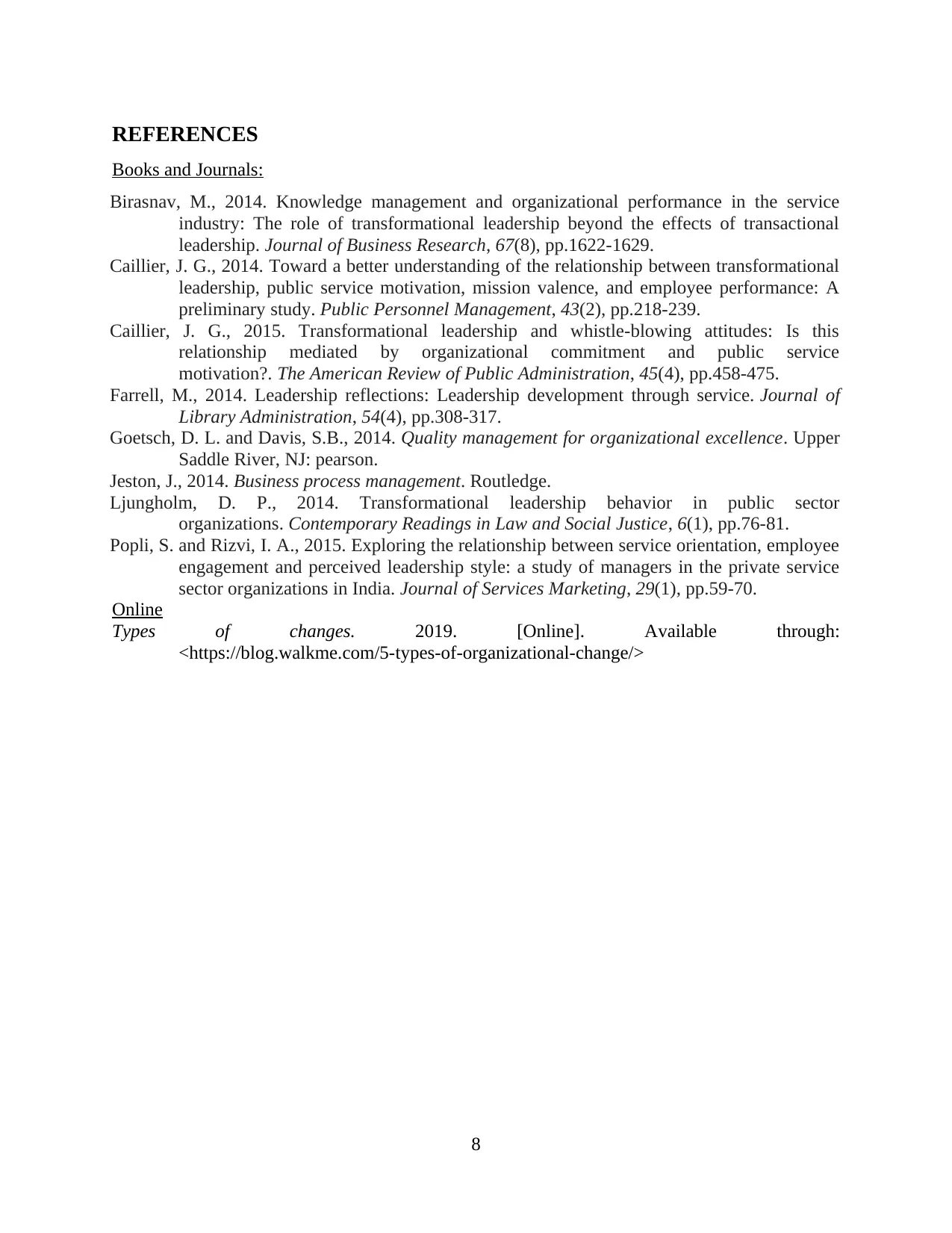
REFERENCES
Books and Journals:
Birasnav, M., 2014. Knowledge management and organizational performance in the service
industry: The role of transformational leadership beyond the effects of transactional
leadership. Journal of Business Research, 67(8), pp.1622-1629.
Caillier, J. G., 2014. Toward a better understanding of the relationship between transformational
leadership, public service motivation, mission valence, and employee performance: A
preliminary study. Public Personnel Management, 43(2), pp.218-239.
Caillier, J. G., 2015. Transformational leadership and whistle-blowing attitudes: Is this
relationship mediated by organizational commitment and public service
motivation?. The American Review of Public Administration, 45(4), pp.458-475.
Farrell, M., 2014. Leadership reflections: Leadership development through service. Journal of
Library Administration, 54(4), pp.308-317.
Goetsch, D. L. and Davis, S.B., 2014. Quality management for organizational excellence. Upper
Saddle River, NJ: pearson.
Jeston, J., 2014. Business process management. Routledge.
Ljungholm, D. P., 2014. Transformational leadership behavior in public sector
organizations. Contemporary Readings in Law and Social Justice, 6(1), pp.76-81.
Popli, S. and Rizvi, I. A., 2015. Exploring the relationship between service orientation, employee
engagement and perceived leadership style: a study of managers in the private service
sector organizations in India. Journal of Services Marketing, 29(1), pp.59-70.
Online
Types of changes. 2019. [Online]. Available through:
<https://blog.walkme.com/5-types-of-organizational-change/>
8
Books and Journals:
Birasnav, M., 2014. Knowledge management and organizational performance in the service
industry: The role of transformational leadership beyond the effects of transactional
leadership. Journal of Business Research, 67(8), pp.1622-1629.
Caillier, J. G., 2014. Toward a better understanding of the relationship between transformational
leadership, public service motivation, mission valence, and employee performance: A
preliminary study. Public Personnel Management, 43(2), pp.218-239.
Caillier, J. G., 2015. Transformational leadership and whistle-blowing attitudes: Is this
relationship mediated by organizational commitment and public service
motivation?. The American Review of Public Administration, 45(4), pp.458-475.
Farrell, M., 2014. Leadership reflections: Leadership development through service. Journal of
Library Administration, 54(4), pp.308-317.
Goetsch, D. L. and Davis, S.B., 2014. Quality management for organizational excellence. Upper
Saddle River, NJ: pearson.
Jeston, J., 2014. Business process management. Routledge.
Ljungholm, D. P., 2014. Transformational leadership behavior in public sector
organizations. Contemporary Readings in Law and Social Justice, 6(1), pp.76-81.
Popli, S. and Rizvi, I. A., 2015. Exploring the relationship between service orientation, employee
engagement and perceived leadership style: a study of managers in the private service
sector organizations in India. Journal of Services Marketing, 29(1), pp.59-70.
Online
Types of changes. 2019. [Online]. Available through:
<https://blog.walkme.com/5-types-of-organizational-change/>
8
1 out of 10
Related Documents
Your All-in-One AI-Powered Toolkit for Academic Success.
+13062052269
info@desklib.com
Available 24*7 on WhatsApp / Email
![[object Object]](/_next/static/media/star-bottom.7253800d.svg)
Unlock your academic potential
Copyright © 2020–2025 A2Z Services. All Rights Reserved. Developed and managed by ZUCOL.





